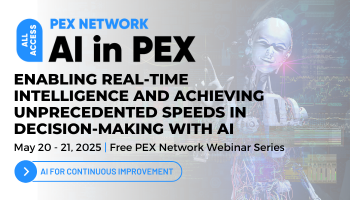Process mining predicts clinical pathways of traumatic brain injuries
Read the latest news as process mining helps predict clinical pathways of traumatic brain injuries
Add bookmarkListen to this content
Audio conversion provided by OpenAI

The latest news in process intelligence and process mining including research, software and user developments.
This week features:
- Process mining predicts clinical pathways of traumatic brain injuries
- Lars Reinkemeyer explores five levels of process intelligence
- Women in Process Mining continues 2025 knowledge sharing
- Process intelligence firm ProcessMaker wins customer success awards
Don't miss any news, updates or insider tips from PEX Network by getting them delivered to your inbox. Sign up to our newsletter and join our community of experts.
Process mining predicts clinical pathways of traumatic brain injuries
Researchers examined how process mining can be applied to help predict clinical pathways of traumatic brain injuries. “Estimating patient journeys, known as clinical pathways (CPs), can support care providers in resource planning and enhancing service efficiency,” they wrote in a new paper.
“Process mining techniques are promising in analyzing clinical pathways from clinical data, enabling the extraction of valuable information from EHRs [electronic health records].” As the treatment behaviors in care processes are remarkably complex, mining clinical pathways is challenging. This often leads to spaghetti-like processes which are difficult to understand and not appropriate for assisting clinical experts.
“Although deep-based process mining approaches overcome this challenge to a certain degree by giving accurate predictions, the black box nature of such algorithms does not allow their integration into medical practice, where transparency and interpretability are crucial.” The researchers wrote.
They applied a framework to characterize and predict clinical pathways using real-world event data of individuals diagnosed as being at risk from the National Trauma Registry of Iran (NTRI). “The proposed approach is validated through a real-life event data, demonstrating high accuracy and providing insights into the rationale behind specific clinical pathways predictions which facilitate the adoption of machine learning models in clinical settings.”
However, its perspicuity (how easy it is to learn and use) is just below average, the researchers noted. “This could be due to the fact that most of the users were not particularly familiar with the process mining concepts. Therefore, to improve the perspicuity of the process mining techniques, it could be important to plan a training phase beforehand, in which users get familiar with the them.”
Watch Tony Benedict, president of the Association of BPM Professionals International, duscuss breaking down process silos
Lars Reinkemeyer explores five levels of process intelligence
In a new series of videos, Lars Reinkemeyer, chief evangelist at Celonis, explored five levels of process intelligence in conversation with five different people.
- Speaking to a child, Reinkemeyer explained that level one is understanding the ideal sequence of everyday processes, discovering where deviations exist and determining how they can be improved.
- Speaking to an adult about airline functions, Reinkemeyer said that level two is visualizing entire complex process flows to identify optimal workflows, causes for delays and highlight improvements.
- Speaking to a Lean Six Sigma Black Belt, Reinkemeyer explained that level three utilizes data to build a digital twin of an overall process, creating transparency and highlighting where things go wrong.
- Speaking to a supply chain lead, Reinkemeyer said that level four provides a copilot that detects early process defects, suggests enhancements and even take action to make processes better.
- Speaking to a chief financial officer (CFO), Reinkemeyer explained that level five involves object-centric process mining that can focus on a single object (e.g. a purchase order) and examine how it moves through an organization, identifying causes of friction.
A recent Celonis survey found that 89 percent of business decision-makers believe process intelligence is key to achieving success with artificial intelligence (AI).
Register for All Access: Process Intelligence and Process Mining
Women in Process Mining continues 2025 knowledge sharing
Women in Process Mining (WIPM) continued its 2025 program of knowledge sharing, networking and empowerment. It hosted its first Local Chapter event in Berlin, where Hannah Yasin, team lead data and analytics at adesso SE, reflected on her journey to becoming a leader in the process mining space. She led attendees through real-life process mining use cases that have helped shape her interest and expertise in the field, providing a glimpse into practical applications in the industry.
WIPM also hosted a virtual fireside chat with professor Dr. Agnes Koschmider, professor of informatics at the University of Bayreuth and head of the Process Analytics Group. Reflecting on her process mining research, Koschmider discussed the importance of data in process mining and the role that techniques such as large language models (LLMs) can play in improving data quality. She also spoke about the need for more role models, positive environments and opportunities for females in technology.
Watch Madison Lundquist, principal research lead, process and performance management at APQC, reflect on the state of process strategy
Process intelligence firm ProcessMaker wins customer success awards
Process intelligence provider ProcessMaker was named a winner in two categories for the 2025 APPEALIE SaaS Customer Success Awards: Development & DevOps for Enterprise Businesses and IT Management & Operations for the Mid-Market. The recognition highlights Processmaker’s commitment to driving business transformation through business process automation, the company said. APPEALIE evaluates winners based on key criteria including Net Promoter Scores™ (NPS), user experience, innovation and customer feedback.
“We are honored to be recognized with the 2025 APPEALIE SaaS Customer Success Award,” said Alex George, CEO at ProcessMaker. “This award is a testament to our team’s dedication to helping customers achieve process excellence. Our goal is to ensure that every organization using ProcessMaker experiences meaningful transformation and efficiency gains.”
All Access: AI in PEX is 2025

All Access: AI in PEX 2025 is designed to address these challenges and empower organizations to successfully integrate AI into their process improvement initiatives. The content series will bring together industry experts, thought leaders, and practitioners to share insights, best practices, and real-world case studies.
Register Now













